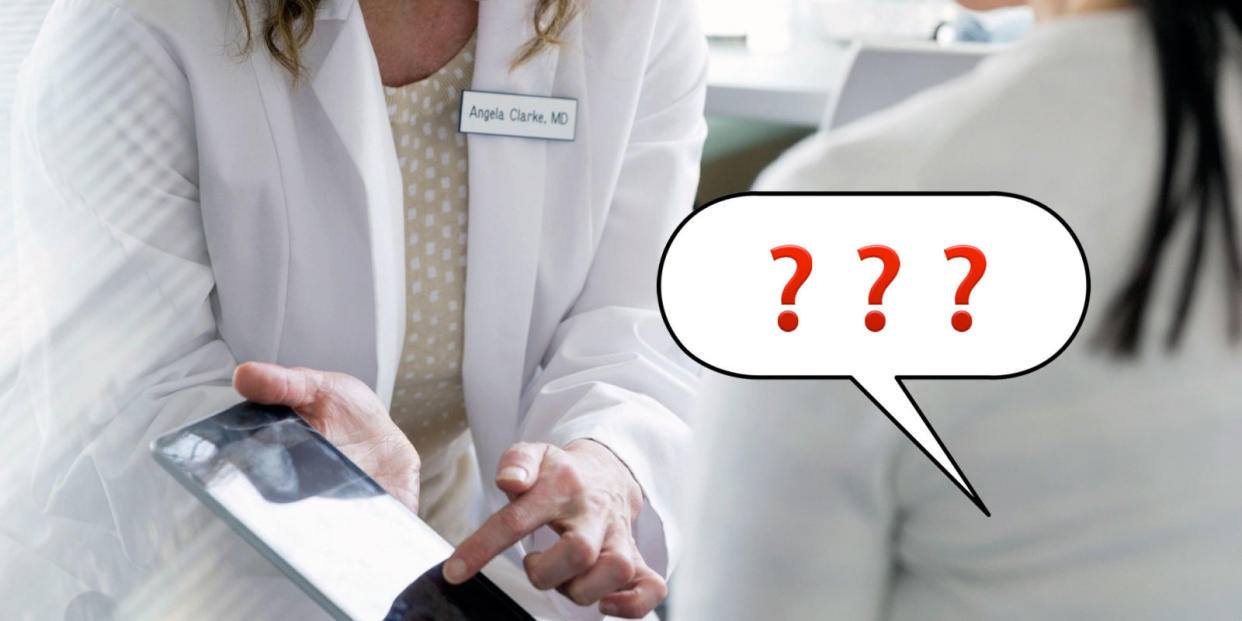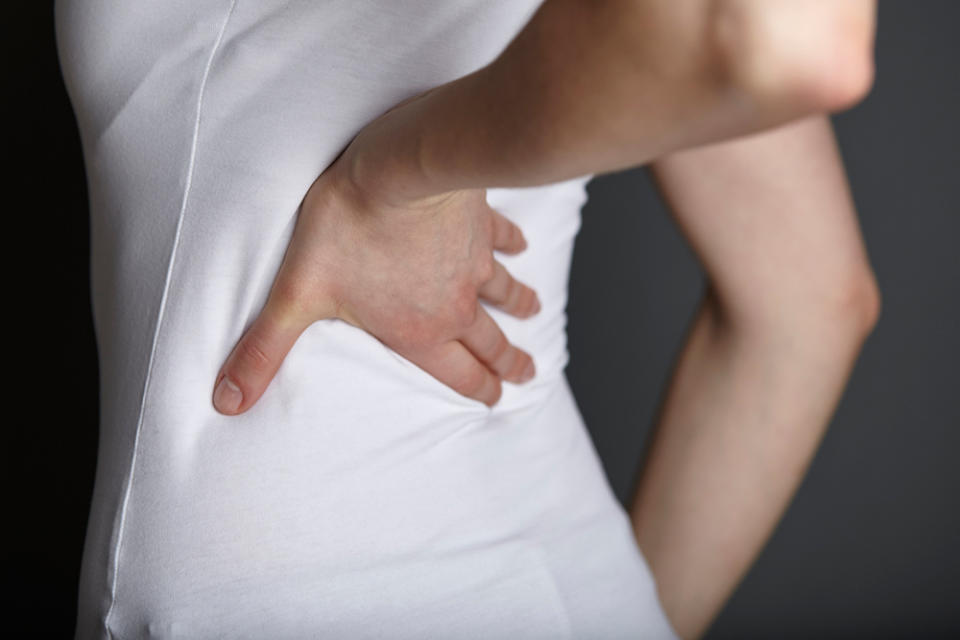10 Questions You Should Ask Your Doctor At Every Age

When you head to the doctor for your annual check-up, it's easy to be swept in and out in 15 minutes or less, leaving you flustered and wondering whether it was really all that productive. Go into your next visit with these questions written down-that way you won't forget them when you're exchanging pleasantries.
In Your 20s
Q. Am I at risk for PCOS?
Polycystic ovary syndrome, or PCOS, is a hormonal endocrine disorder. When women have it, they typically have enlarged ovaries, and symptoms often include infrequent or prolonged periods, excess hair growth, acne, and obesity. "The condition is becoming an epidemic, with many young women having subtle symptoms that impact their hair, skin and weight in their 20s," integrative health expert, Taz Bhatia, M.D., explains. "But most importantly, it affects long-term fertility, which is why you want to start asking about it early."
Despite the fact that PCOS is responsible for 70 percent of infertility issues in women who have difficulty ovulating, most don't understand their risk for PCOS until they've already begun trying to get pregnant.
Having a conversation with your doctor early, ideally before you're ready to start a family, can potentially save you a large sum of money on medical interventions like IVF. Those who tend to be at the highest risk? Women with a family history of PCOS, irregular periods or diabetes.
Q. Can I get my hormones checked?
Your hormone patterns play a critical role in your energy levels, fat storage, and sex drive, so if you're gaining weight (even after you've given up your morning donut), feeling more sleepy than usual, and uncharacteristically not in the mood to, well, you know, those could be signs that something's off.

If you suspect you might have PCOS, the earliest signs of a troubled thyroid, high estrogen levels or low progesterone levels can all be picked up through testing, and if they're caught early they can be treated properly. Tests typically involve a quick blood draw or saliva swab, and it's best to have it done during the first few days of your period.
In Your 30s
Q. How is my digestive health?
One of the many perks of getting older is that your digestive system starts to slow down. Keeping it in tip-top shape is critical to ensure your circulatory, endocrine and cardiovascular systems all run smoothly as well. Now's the time to check in with how you're feeling and quit skating by on a diet of processed foods, as tasty as they are, says Bhatia.
Symptoms like reflux, constipation, and bloating are signs that you're in need of a tune-up. A conversation with your doc can make sure other health issues often connected to inflammation (like Crohn's and ulcerative colitis) aren't at play. If it comes down to it, your doctor may refer you to a gastroenterologist. "Tackling any issues with digestion can also help prevent inflammation, which tends to be the root cause of nearly every illness we see today," says Bhatia.
Q. Do I have nutritional deficiencies?
Here's a scary fact: Research shows that about 75 percent of women would likely be nutrient deficient if supplemental vitamins didn't exist. Women in general tend to be deficient in vitamin D and iron, and the risk of vitamin and mineral deficiency only increases with age, says Bhatia.

That's a problem because, over time, micronutrient deficiencies can lead to disease, she says. Vitamin D deficiency, for example, can lead to osteomalacia, which causes weak bones and muscles. Not getting enough iron can eventually develop into iron deficiency anemia, and that can lead to a rapid or irregular heartbeat and problems with pregnancy. So be sure to ask your doctor about your own nutrient balance. Not sure where to start? "The B vitamins, vitamin D, E, fats, magnesium, and iron are some of the critical micronutrients that you should begin monitoring in your 30s," says Bhatia.
In Your 40s
Q. Is my inflammation a sign of anything worse?
Inflammation often plays a role in cancer, autoimmune diseases, and mental health issues, Bhatia says. So it's important to understand what inflammation is-the body's response to external threats like stress, infection, or toxic chemicals, according to the National Library of Medicine. Knowing whether yours is flaring up in an unhealthy way (inflammation is good when your body is working to heal a wound, for example) can be a way to catch the early signs of something more serious brewing under the surface, says Bhatia. She adds that it's an easy form of preventative medicine, so don't shy away, especially when there's a family history.
Q. How are my estrogen and progesterone levels?
"Watching these hormones, and making sure they aren't too high or too low, may prevent cancer and other diseases that women face in their 40s," says Bhatia. Estrogen starts to decline as you age, but progesterone and testosterone levels also need to be monitored.
Q. When do I get a mammogram?
If you don't have any risk factors for breast cancer - family history, the BRCA1 and BRCA2 gene, and having dense breast tissue, for example - then baseline mammograms typically start at age 40, says Bhatia. The U.S. Preventative Services Task Force, though, recommended in 2016 that screening begin at age 50 and be repeated every 2 or 3 years, rather than annually, as long as there are no concerning issues showing up in your tests. But asking your doctor will help you determine the best age for you to begin getting mammograms and how frequently you need them.
In Your 50s
Q. Should I get a bone scan?
Understanding your risk for osteoporosis-a condition that affects 54 million Americans, in which bones become brittle from loss of tissue-is important because it's really difficult to build bone later in life, says Bhatia. Getting bone scans can help prevent trouble later down the road.
Keep in mind that chronic use of certain medications, like heparin, cortisone and prednisone, and disorders like hyperthyroidism and celiac disease, can hasten the progression of osteoporosis, says Bhatia. So if any of the above are a part of your health history, make sure your doctor is aware and ask how frequently you should get scanned. Otherwise, be sure to get in plenty of calcium-the National Institutes of Health recommends women over 50 get 1,200 mg per day. Also, if you aren't already, start lifting weights to boost bone health.
Q. Do I need a colonoscopy?
"Colonoscopies are used to assess gut health, and it's important that you have them done in your 50s as they serve as a preventative measure against colon cancer," says Bhatia.
That said, if you have risk factors, including a family history and heavy smoking or alcohol use, or if you are dealing with digestive diseases like Crohn's or inflammatory bowel disease (IBD), your doctor may want you to get checked sooner and more frequently.
Q. Why am I gaining weight?
Women typically enter menopause around age 52, and when that happens, ovaries stop producing estrogen. That can lead to a whole host of side effects (disrupted sleep, hot flashes, decreased sex drive), but one of the biggest is weight gain in the midsection.

So if you're gaining weight all of a sudden and can't seem to lose it, talk to your doctor. They'll be able to help identify other signs of menopause, and work with you to develop a new, more effective fitness routine that suits your lifestyle.
You Might Also Like

